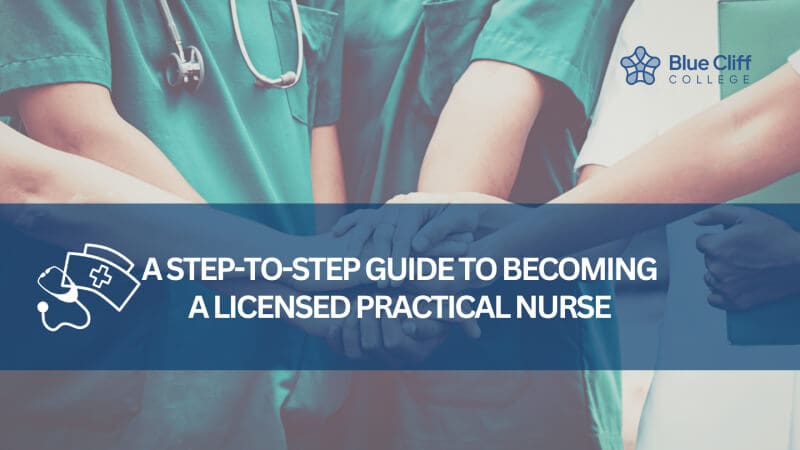Ask a nurse, “How much time did you spend studying in nursing school?” While the exact time spent may vary, the general answer is, “a lot!” No matter how heavy the study load, carry it smartly. Utilize the LPN School study skills below during your educational journey with Blue Cliff College’s Licensed Practical Nurse program.
Take The First Step in Your Career Journey Today!
Time Management
You must make time to study, in order to have time to study! In nursing school, you must be able to manage your time effectively. Your phone should have apps that allow you to create ‘To-Do’ lists and calendars. Finding a system you will use and will work for you will help you manage your time and keep track of assignments. If you prefer to go analog, paper versions of the same can work as well.
Here are some basic strategies for how to handle the practical nursing program:
Start of the Program: At the beginning of the program, schedule more time than you think it will take for studying. If you are done early, great! If not, you’ve already got the time blocked so you don’t have to rearrange your schedule or start falling behind. You’ll soon discover how much time you’re likely going to need to dedicate to studying during the semester.
Steady-State: For most of the semester you’ll be running relatively consistent. You now know (from the first few weeks) how much time you need to schedule for studying. This may increase around certain examinations. However, you should be able to predict and schedule for the necessary time.
End of the Program: Plan to increase the time spent in the last several weeks as preparations for examinations and certifications intensify. This time may also overlap with job hunting and educational or other professional follow-on activities.
Two big things to be aware of when scheduling are schedule density and slack. Density refers to how full your schedule is. Leave some unscheduled time for emergencies and life. Slack refers to how close the items are in the schedule. Leave some room for things to take a little longer than they do. This will avoid the ‘domino effect’ impact of something not going as planned.
Now that you have the time to study, what do you study?
Learning How You Learn
What’s the most effective way to learn? Sitting for many hours straight? Multiple short exposures throughout the day? The answer is, it depends. If you haven’t already discovered what works best for you, try some of these ideas:
- Skim the Material: read through the material at a high-level for structure, checking the heading and subheadings. Quickly read through the vocabulary and key concepts. This will familiarize you with the information.
- Read and Take ‘Good’ Notes: Not everything in the text can be on the test. Take a ‘good’ set of notes from the assigned text. ‘Good’ notes should include all the information from your skimming of the text: a basic outline with keywords and concepts. It should also include enough explanation of these items so you can explain them to someone else by referencing your notes and not the text. Do this prior to the lecture on the same material.
- Refine Your Notes: Attend the lecture with your ‘good’ notes from reading. Mark the sections your instructor covers or calls special attention to. Add additional details from the lecture to your notes. Seek additional information from your instructor, the text, and other research sources to fill-in the remaining details to complete your understanding. Study this version of your notes.
- Use Study Guides to Supplement: Remember, you are in a highly standardized and credentialed field. There are many study guides and resources available. These can range from articles like the one you are currently reading to YouTube videos. They’ll cover topics from general nursing to the NCLEX examination. You are not alone in your journey.
Be willing to try new ways of studying and note taking. Do what works best for you. If group study works, do that. If flashcards work, do that. If group study with flashcards works….
Bring the Best You
Nursing school is not impossible. It’s not easy either. This is not a sprint, it’s a marathon. Understand your self-care routine. Follow these quick tips:
- Sleep: Missing sleep to ‘cram’ for a test will hurt your performance on the test. Also, the volume of material and depth of knowledge required for certification exceeds what one could ‘cram’ their way through. This is not about memorizing. Taking the NCLEX exam is all about applying what you have learned. You cannot pass through memorization. Study some each day and keep good sleep hygiene.
- Hydration: Being dehydrated can cause fatigue and confusion¹. Several things can impact your hydration from a night of partying with friends to changing temperature and humidity. Carry a water bottle with you if necessary to keep yourself feeling your best.
- Diet: There are several potential issues with food. Some people become so busy they forget to eat. Some people grab fast-food for the sake of convenience. Some people snack constantly while studying. Whatever your personal challenge, be mindful. Pay attention to your diet’s impact on your overall mood and ability to concentrate. Get tested if you suspect a food allergy or sensitivity.
- Exercise: You don’t have to try out for a professional sports team. Find what works for you. You may find yourself sitting more than usual. Do some light stretches in place. Try some beginner yoga. Go for a walk. Don’t over complicate it. If nothing else, turn up the music and dance.
- Socialize: Yes, the hours studying can be a lonely pursuit. Build your support team. If you find studying with others helpful, find a productive study group. Schedule time with friends and family away from nursing. Come up for some air from time to time. Get your team together and check in with them regularly.
Take care of the body that carries around the brain. Don’t forget the ‘Airplane Rule’. Put your mask on first. You can’t be a great Caregiver if you can’t first give care to yourself. You are making an investment in You with your education. Make the same investment in your well-being.
The Licensed Practical Nursing Program at Blue Cliff College Can Help You Realize Your Dreams
Studying is a learned and practiced skill. You will be a lifelong learner in any professional medical discipline. Discover what works for you. Just like you would have a medical protocol, what’s your study protocol? Enjoy the process and the reward at the end with Blue Cliff’s LPN School.
Practical Nursing students at Blue Cliff College are prepared for entry-level positions in the healthcare industry. By utilizing our faculty and fully equipped medical labs, students can obtain hands-on training on how to perform medical procedures. Our goal is to help you find a Practical Nursing program that meets your academic needs in Louisiana!
Learn More About Licensed Practical Nursing at Blue Cliff College
Resources:





